Background
Robert Kuttner was born on April 17, 1943, in New York City, New York, United States. He is the son of Arthur Paul Kuttner and Pauline M. Levy.
Oberlin, Ohio, United States
In 1965 Robert Kuttner received a Bachelor of Arts degree from the Oberlin College.
Berkeley, California, United States
In 1966 Robert Kuttner obtained a Master of Arts degree from the University California, Berkeley.
London, United Kingdom
Robert Kuttner attended the London School of Economics from 1963 to 1964.
Robert Kuttner
Robert Kuttner
Robert Kuttner
Robert Kuttner








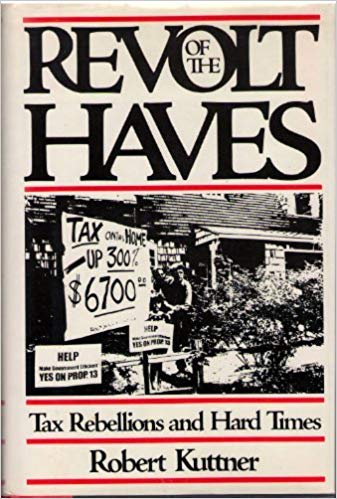
(Revolt of the Haves is about the great taxpayer revolt of...)
Revolt of the Haves is about the great taxpayer revolt of the late 1970s. The national tax revolt spurred by California's Proposition 13 assumed the status of a political watershed, separating the New Deal-Great Society era from a newer, leaner period that found the public far more careful of tax dollars, and increasingly skeptical of the government's competence to solve problems. This sweeping narrative begins with a full recounting of the evolution of Prop 13.
https://www.amazon.com/Revolt-Haves-Rebellions-Hard-Times/dp/067125099X/?tag=2022091-20
1980
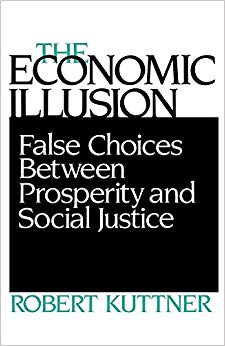
(In The Economic Illusion Robert Kuttner sets out to refut...)
In The Economic Illusion Robert Kuttner sets out to refute the conventional view that a more egalitarian distribution of income and services is only achievable at the expense of a prosperous and growing capitalism. By carefully examining issues where economic growth and social justice appear to be in conflict — issues such as social security, protectionism, income taxation, and welfare — he convincingly argues that equality and economic prosperity are not mutually exclusive pursuits. As a means to reconcile equality with efficiency — i.e., prosperity — Kuttner argues for economic polices that would deemphasize private markets, for an increase in trade protection, and for an adapted version of the technical approaches of such countries as Sweden, Germany, Austria, and Japan. Kuttner concludes his arguments with the suggestion that injustice is not necessarily an economic issue and that practical social alternatives are possible.
https://www.amazon.com/Economic-Illusion-Choices-Between-Prosperity/dp/0812212401/?tag=2022091-20
1984

(On the eve of a watershed election, here is the in-depth ...)
On the eve of a watershed election, here is the in-depth re-examination of the progressive Democratic tradition, an incisive look into the state of the party, and a call to arms for those who hope to lead the party into the future.
https://www.amazon.com/gp/product/0670815640/?tag=2022091-20
1987

(This book explores what American economic policy should a...)
This book explores what American economic policy should and can be — a superb yet controversial interpretation of the relation between domestic economic health and international politics, and of how we should set priorities to maintain our economy and our competitive vigor in the future.
https://www.amazon.com/End-Laissez-Faire-National-Purpose-Economy/dp/0812214013/?tag=2022091-20
1991

(This book argues that with the rise of the Republican-con...)
This book argues that with the rise of the Republican-controlled Congress, the country is in danger of economic despair and political decay.
https://www.amazon.com/Ticking-Time-Bombs-Conservative-Democracy/dp/1565843460/?tag=2022091-20
1996
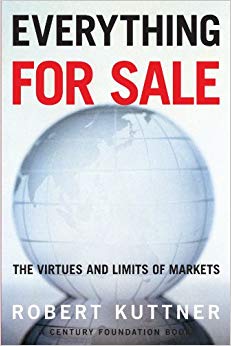
(In this highly acclaimed, provocative book, Robert Kuttne...)
In this highly acclaimed, provocative book, Robert Kuttner disputes the laissez-faire direction of both economic theory and practice that has been gaining in prominence since the mid-1970s. Dissenting voices, Kuttner argues, have been drowned out by a stream of circular arguments and complex mathematical models that ignore real-world conditions and disregard values that can't easily be turned into commodities. With its brilliant explanation of how some sectors of the economy require a blend of market, regulation, and social outlay, and a new preface addressing the current global economic crisis, Kuttner's study will play an important role in policy-making for the twenty-first century.
https://www.amazon.com/Everything-Sale-Virtues-Limits-Markets/dp/0226465551/?tag=2022091-20
1997

(A journalist joins forces with his psychologist wife to o...)
A journalist joins forces with his psychologist wife to offer useful advice to middle-aged parents on how to forge meaningful relationships with both their grown children and elderly parents.
https://www.amazon.com/gp/product/0684827220/?tag=2022091-20
2002

(A passionate, articulate argument detailing how the Unite...)
A passionate, articulate argument detailing how the United States political system has failed to adapt to the economic challenges of the late 20th and early 21st centuries. The American economy is in peril. It has fallen hostage to a casino of financial speculation, creating instability as well as inequality. Tens of millions of workers are vulnerable to layoffs and outsourcing, health care and retirement burdens are increasingly being shifted from employers to individuals. Here Kuttner debunks alarmist claims about supposed economic hazards and exposes the genuine dangers: hedge funds and private equity run amok, sub-prime lenders, Wall Street middlemen, and America's dependence on foreign central banks. He then outlines a persuasive, bold alternative, a new model of managed capitalism that can deliver security and opportunity, and rekindle democracy as we know it.
https://www.amazon.com/gp/product/B001K9JVSW/?tag=2022091-20
2007
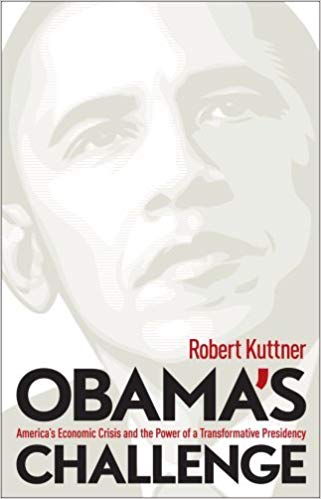
(Barack Obama approaches the Presidency at a critical mome...)
Barack Obama approaches the Presidency at a critical moment in American history, facing simultaneous crises of war, the environment, health care, but most especially in the economy. If he is able to rise to the moment, he could join the ranks of a small handful of previous presidents who have been truly transformative, succeeding in fundamentally changing our economy, society, and democracy for the better. But this will require imaginative and decisive action as Obama takes office, action bolder than he has promised during his campaign, and will be all the more difficult given the undertow of conventional wisdom in Washington and on Wall Street that resists fundamental change. Decades of regressive politics and political gridlock have left America in its most precarious situation since the onset of the Great Depression. The collapse of the housing bubble continues, as does the financial meltdown it triggered; a revival of 1970s style stagflation threatens; incomes continue to lag behind inflation; our household and international debts pile higher; disastrous climate change looms; energy and food prices continue their escalation; and the ranks of un- and under-insured Americans grow, the clearest, and most heartless, example of America’s destructive inequalities.
https://www.amazon.com/gp/product/B001E1Y6F4/?tag=2022091-20
2008
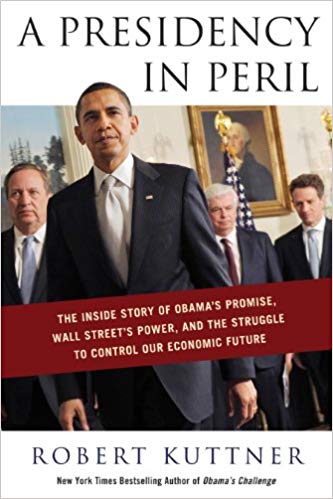
(When Barack Obama took office in January 2009, he had an ...)
When Barack Obama took office in January 2009, he had an unprecedented chance to do what no other recent president could: seize the nation's financial reins from the corporate elite and return them to the American people. Progressives everywhere held out hope that their new leader would take advantage of the economic crisis he stepped into and enact bold policies that would evoke real financial reforms-putting Main Street in front of Wall Street, at last. But that, writes Robert Kuttner, is not the way things turned out. Instead, America's best chance for radical financial reform turned into Wall Street's greatest victory. Obama filled his administration with allies of financial elites who were more interested in business as usual than in transformative change. As a consequence, Main Street remained mired in deep recession. Instead of being the instrument of economic renewal, Obama became the target of economic frustration. In this hard-hitting, incisive account, Kuttner shares his unique, insider view of how the Obama administration not only missed its moment to turn our economy around-but deepened Wall Street's risky grip on America's future. Carefully constructing a one-year history of the problem, the players, and the outcome, Kuttner gives readers an unparalleled account of the president's first year. More importantly, though, Kuttner shows how we could-with swift, decisive action-still enact real reforms. This is a book not to be missed by anyone who wants to understand exactly how Wall Street won, and how Main Street can still fight back.
https://www.amazon.com/gp/product/1603582703/?tag=2022091-20
2010
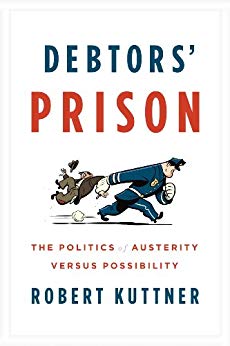
(Since the collapse of September 2008, the conversation ab...)
Since the collapse of September 2008, the conversation about economic recovery has centered on the question of debt: whether we have too much of it, whose debt to forgive, and how to cut the deficit. These questions dominated the sound bites of the 2012 United States presidential election, the fiscal-cliff debates, and the perverse policies of the European Union. Robert Kuttner makes the most powerful argument to date that these are the wrong questions and that austerity is the wrong answer. Blending economics with historical contrasts of effective debt relief and punitive debt enforcement, he makes clear that universal belt-tightening, as a prescription for recession, defies economic logic. And while the public debt gets most of the attention, it is private debts that crashed the economy and are sandbagging the recovery — mortgages, student loans, consumer borrowing to make up for lagging wages, speculative shortfalls incurred by banks. As Kuttner observes, corporations get to use bankruptcy to walk away from debts. Homeowners and small nations don’t. Thus, we need more public borrowing and investment to revive a depressed economy, and more forgiveness and reform of the overhang of past debts.
https://www.amazon.com/gp/product/B00A1O4L46/?tag=2022091-20
2013
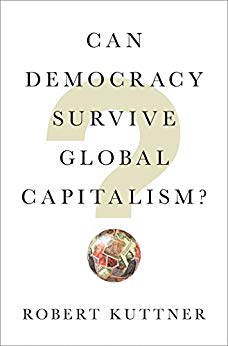
(In the past few decades, the wages of most workers have s...)
In the past few decades, the wages of most workers have stagnated, even as productivity increased. Social supports have been cut, while corporations have achieved record profits. Downward mobility has produced political backlash. What is going on? Can Democracy Survive Global Capitalism? argues that neither trade nor immigration nor technological change is responsible for the harm to workers’ prospects. According to Robert Kuttner, global capitalism is to blame. By limiting workers’ rights, liberating bankers, allowing corporations to evade taxation, and preventing nations from assuring economic security, raw capitalism strikes at the very foundation of a healthy democracy.
https://www.amazon.com/gp/product/B073VXT1M2/?tag=2022091-20
2018
Robert Kuttner was born on April 17, 1943, in New York City, New York, United States. He is the son of Arthur Paul Kuttner and Pauline M. Levy.
Robert Kuttner attended the London School of Economics from 1963 to 1964 and received a certificate. In 1965 he obtained a Bachelor of Arts degree from the Oberlin College. In 1966 he received a Master of Arts degree from the University California, Berkeley.
In 1966 Robert Kuttner was appointed as an assistant to I.F. Stone in Washington. From 1967 to 1968 he served as a legislation assistant to congressman W.F. Ryan. Kuttner worked as a correspondent program director of the Pacifica Radio in New York City. From 1971 to 1973 he was an editor of Village Voice, Washington. He was a contributing editor of More Magazine, Washington from 1973 to 1978. Kuttner was a staff writer of Washington Post from 1974 to 1975. He served as a chief investigator at the United States Senate Committee on Banking, Housing, and Urban Affairs from 1975 to 1978.
From 1980 to 1983 Kuttner was an editor of Working Papers, Massachusetts. From 1980 to 1982 Kuttner was a lecturer at the Boston University. He worked as an economics writer and editor of New Republic from 1983 to 1991. He was a columnist of Business Week from 1984 to 2006 and for Boston Globe since 1985 till around 2005. Kuttner was a visiting professor at the University of Massachusetts from 1987 to 1988. Since 1989 Robert Kuttner has been working as a co-editor of American Prospect. He served as a visiting professor at the Brandeis University, Massachusetts, from 1991 to 1992.
Currently, he writes columns in and for the Huffington Post, The Boston Globe, and The New York Times international edition. Kuttner teaches two courses at the Heller School: on Globalization and Democracy and on the Political Economy of the American Welfare State.
Robert Kuttner was a founder of the Economic Policy Institute and serves on its board. He is an author of ten books, including the 2008 New York Times bestseller "Obama's Challenge: American's Economic Crisis and the Power of a Transformative Presidency". He is also best-known for his book "Everything for Sale: the Virtues and Limits of Markets". In 2015 Kuttner received an honorary doctorate from Oberlin College.
(This book explores what American economic policy should a...)
1991(On the eve of a watershed election, here is the in-depth ...)
1987(When Barack Obama took office in January 2009, he had an ...)
2010(In The Economic Illusion Robert Kuttner sets out to refut...)
1984(Since the collapse of September 2008, the conversation ab...)
2013(A journalist joins forces with his psychologist wife to o...)
2002(In this highly acclaimed, provocative book, Robert Kuttne...)
1997(Barack Obama approaches the Presidency at a critical mome...)
2008(A passionate, articulate argument detailing how the Unite...)
2007(This book argues that with the rise of the Republican-con...)
1996(In the past few decades, the wages of most workers have s...)
2018(Revolt of the Haves is about the great taxpayer revolt of...)
1980On December 19, 1971 Robert Kuttner married Sharland Grace Trotter, a psychotherapist and author. In November 1997 she died. They have two children: a son, Gabriel and a daughter, Jessica. On May 7, 2000 he married Joan Fitzgerald.
